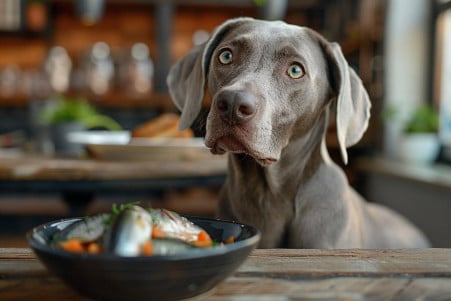Can Dogs Eat Anchovies? A Look at the Risks and Benefits
6 May 2024 • Updated 4 May 2024

While the salty, fishy flavor of anchovies may not be the first thing that comes to mind when you think of a dog treat, can you give your pup these small fish? While anchovies can be a good snack for dogs, they are high in salt, so it's important to be careful about how much you give them. As a result, it's best to give your dog a small amount of anchovies as a treat every once in a while and make sure they always have access to fresh water when they eat salty foods.
By exploring the nutritional content and potential risks of giving your dog anchovies, this article will cover information from veterinarians, animal nutritionists, and dog parents. This will help you better understand the nutritional needs of dogs versus humans, so you can make sure you're giving your dog anchovies in a way that won't lead to overconsumption and the health issues that can come with it.
Can dogs eat anchovies?
Nutritional Benefits of Anchovies for Dogs
Anchovies are often called a superfood for dogs because they are rich in omega-3 fatty acids, which can help improve skin, joint, and heart health. In addition to being a great source of lean protein, anchovies also contain important vitamins (A, E, K, B-6, B-12) and minerals (calcium, iron, selenium). The omega-3s found in anchovies can help fight inflammation, promote brain health, and improve the health and appearance of a dog's skin and coat.
Because anchovies are small fish, they are lower on the food chain and therefore contain fewer contaminants and toxins such as mercury than larger fish. The vitamins and minerals in anchovies can help improve a dog's metabolism, digestion, and overall health when they are part of a dog's diet. According to The Farmer's Dog, anchovies are rich in omega-3 fatty acids including DHA and EPA, which are anti-inflammatory and can help improve a dog's skin, coat, heart, brain, and immune system.
Potential Risks and Concerns of Feeding Anchovies to Dogs
Although there are several potential benefits to feeding anchovies to dogs, there are also some risks and concerns to consider. One of the main concerns is the high sodium content in anchovies, which can be dangerous to dogs if it's consumed in large amounts, according to MasterClass. In addition, the small bones in anchovies can be a choking hazard and can cause internal damage if they aren't removed or fed to dogs in a safe way.
Canned anchovies may also contain added salt, oils, or seasonings that can be harmful to dogs, so it’s important to read the label carefully before feeding them to your dog, per Dope Dog. Furthermore, dogs with health issues like kidney disease or high blood pressure may need to follow a low-sodium diet, which can make anchovies an unsuitable food for them.
As with any new food, it’s important to introduce anchovies to your dog’s diet slowly to watch for signs of an allergic reaction or digestive upset, according to WagWalking. If your dog is allergic or sensitive to fish, they may not be able to eat anchovies, or you may need to talk to your vet before feeding them to your dog.
How to Prepare and Serve Anchovies to Dogs
The best and safest ways to give anchovies to dogs are fresh, frozen, or canned in water with no salt or other seasonings, according to The Canine Nutritionist. Anchovies should be boneless and cut or mashed to avoid choking, especially for small dogs.
Dope Dog recommends serving sizes of 2-3 anchovies for small dogs and up to 5 anchovies for large dogs. Start with smaller amounts and watch for any signs of intolerance or digestive upset before increasing the serving size. Anchovies should be used as an occasional treat or supplement and not be a regular part of a dog's diet.
Watch for Allergies and Digestive Upset
As with any new food, anchovies can cause allergic reactions in some dogs, which may include itchy skin, ear infections, vomiting, or digestive upset, according to WagWalking. Dogs with known fish allergies or sensitivities may need to avoid anchovies or consult with a veterinarian before adding them to their diet. This is because, as VCA Animal Hospitals notes, any food ingredient can cause an allergy, with proteins being the most common cause.
Since symptoms of an anchovy allergy or sensitivity may not show up until hours or even days after the food is consumed, it's important to monitor your dog closely after you first give them anchovies. If you notice any signs of a problem, stop giving your dog anchovies and talk to your vet about how to address potential food allergies or sensitivities, a step that Dogs Naturally recommends. In addition, you can help prevent digestive upset and the risk of overfeeding by introducing anchovies slowly and keeping an eye on how much you give your dog.
Moderation and Balance: How to Add Anchovies to Your Dog's Diet
Anchovies should be given in moderation and as an occasional treat or supplement, not as a daily or regular part of a dog's diet. As noted by Dope Dog, overconsumption of anchovies can result in potential problems such as sodium toxicity, obesity, or gastrointestinal upset. We Feed Raw suggests that anchovies should be no more than 10% of a dog's daily caloric intake to ensure that they're eating a well-rounded and diverse diet.
It's also important to take a dog's individual dietary requirements, health issues, and exercise levels into account when determining how much and how often to give anchovies. As mentioned by Dope Dog, the salt in anchovies can be harmful to dogs, particularly those with heart or kidney issues. A veterinarian or canine nutritionist can offer individualized advice on how to safely add anchovies to a dog's diet.
Conclusion: Feed Anchovies to Your Dog as an Occasional Healthy Snack
As long as you feed them in moderation and take the necessary precautions, anchovies can be a healthy and nutritious snack for your dog. They are a good source of omega-3 fatty acids, high-quality protein, and essential vitamins and minerals. However, you should also be aware of their high sodium content, potential for allergies, and the risk of choking on their small bones.
According to DogTime, anchovies are even considered an "unheralded superfood" for dogs, largely because of their high omega-3 fatty acid content. Omega-3s can help improve skin and joint health and have anti-inflammatory effects.
MasterClass explains that anchovies are a good source of protein, omega-3s, vitamins, and minerals, all of which can benefit dogs. However, they caution that the high sodium content in anchovies can be dangerous if consumed in large quantities.
The Canine Nutritionist points out that anchovies are low on the food chain, so they don't contain the high levels of toxic metals like mercury that other fish do. As a result, they are one of the safest and most nutrient-rich fish you can add to your dog's diet.
To ensure the safety of your pet, make sure to prepare anchovies properly, control the portion sizes you feed your dog, and introduce anchovies to your dog's diet slowly. If you do this, you can feel good about feeding anchovies to your dog as an occasional treat that they will enjoy.


